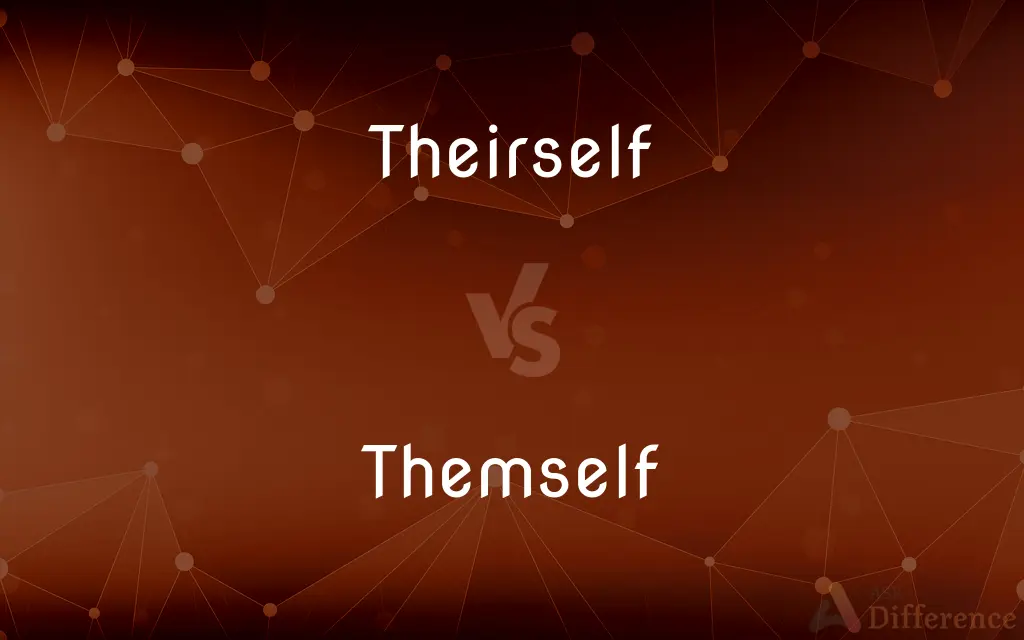Theirself vs. Themself — What's the Difference?
By Tayyaba Rehman — Updated on October 25, 2023
"Theirself" is a nonstandard reflexive form relating to "they," while "themself" is an increasingly accepted singular reflexive pronoun for gender-neutral references.

Difference Between Theirself and Themself
Table of Contents
ADVERTISEMENT
Key Differences
"Theirself" and "Themself" both derive from the pronoun "they." Historically, "they" has been used as a plural pronoun. However, as the English language evolves, "they" is now also recognized as a singular gender-neutral pronoun. Consequently, this shift has given rise to the debate about the reflexive forms, "Theirself" and "Themself."
While "Theirself" might seem like a logical reflexive form for the possessive "their," it remains nonstandard in most contexts. "Theirself" can be perceived as a blend of "themselves" and "themself," yet its usage is less common. It is essential to be cautious while using "Theirself" as it might not be readily accepted in formal writings or communications.
"Themself," on the other hand, has gained traction, especially with the increasing acceptance of "they" as a singular pronoun. It serves as a gender-neutral alternative to "himself" or "herself." As society becomes more conscious of gender fluidity and inclusivity, "Themself" stands as a reflection of this linguistic adaptation.
Despite their similarities and shared origins, the distinction between "Theirself" and "Themself" is primarily in their acceptance and usage. While both aim to provide a reflexive form for "they" in its singular sense, "Themself" has garnered more acceptance in contemporary English, especially in contexts emphasizing gender neutrality.
Comparison Chart
Root Pronoun
"They"
"They"
ADVERTISEMENT
Standard Usage
Nonstandard
Increasingly accepted for singular "they"
Relation
Possessive form (akin to "their")
Object form (akin to "them")
Common Usage Context
Rarely used
Gender-neutral references
Example
"They took the book for theirself." (incorrect)
"Someone left their umbrella; they'll need it themself."
Compare with Definitions
Theirself
A nonstandard reflexive form related to "they."
They did the task by theirself, even though it wasn't common usage.
Themself
An alternative to "himself" or "herself" for gender-neutral references.
Someone should claim this notebook; they might need it themself.
Theirself
Might be seen as the possessive form of "themself."
They owned that opinion entirely by theirself.
Themself
Gaining acceptance in formal and informal contexts.
The artist painted an image of themself, showcasing introspection.
Theirself
A blend of "themselves" and "themself."
They wanted to express theirself in a unique way.
Themself
A reflexive form for singular "they."
Each student should submit their assignment themself.
Theirself
Infrequently used in contemporary English.
By choosing to use 'theirself,' they stood apart.
Themself
Rooted in the object form "them."
Each person should take care of themself.
Theirself
Less accepted compared to "themself."
They used 'theirself' in the essay, sparking debate.
Themself
Recognized in contemporary English as inclusive language.
Every individual has a right to express themself.
Theirself
(nonstandard) themself.
Themself
Used instead of ‘himself’ or ‘herself’ to refer to a person of unspecified sex
The casual observer might easily think themself back in 1945
Theirself
(nonstandard) themselves.
Themself
(reflexive pronoun) The reflexive form of they, the third-person singular personal pronoun. The single person previously mentioned, as the object of a verb or following a preposition also used for emphasis.
Someone could hurt themself.
Anyone who wants a car like mine can buy one themself.
Themself
Synonym of themselves.
Common Curiosities
Can "Theirself" be used in place of "Themself"?
While both words aim to be reflexive forms of "they," "Themself" is more widely accepted than "Theirself."
Why has "Themself" gained popularity?
"Themself" has gained traction due to the acceptance of "they" as a singular gender-neutral pronoun.
Is "Themself" considered grammatically correct?
"Themself" is increasingly recognized as correct, especially with the rise of singular "they."
What does "Theirself" refer to?
"Theirself" is a nonstandard reflexive form related to the pronoun "they."
Are both "Theirself" and "Themself" modern creations?
While their current usage debates are modern, forms of these words have existed in English for centuries.
How is "Themself" different from "themselves"?
"Themself" is used as a singular reflexive pronoun, while "themselves" is plural.
In what contexts might "Themself" be used?
"Themself" can be used in contexts emphasizing gender neutrality or when referring to an individual of unspecified gender.
Is "Themself" only used in American English?
No, "Themself" is used in various English dialects, including British English.
How does "Themself" promote inclusivity?
"Themself" provides a gender-neutral reflexive form, accommodating those who don't identify strictly as male or female.
Is "Theirself" widely accepted in formal writing?
No, "Theirself" is considered nonstandard and is less accepted than "Themself."
Why is "Theirself" seen as a blend of "themselves" and "themself"?
"Theirself" seems to combine the possessive "their" with the reflexive "self," making it appear as a blend of the other two forms.
Is "Theirself" ever the correct choice?
"Theirself" remains nonstandard and is less commonly accepted than "Themself."
How has the usage of "Themself" evolved?
With the growing recognition of "they" as a singular pronoun, "Themself" has gained more acceptance as its reflexive form.
How can I decide whether to use "Theirself" or "Themself"?
Opt for "Themself" when using singular "they" for gender-neutral references; avoid "Theirself" in formal contexts.
Do all English style guides accept "Themself"?
While many style guides now recognize "Themself," it's essential to consult specific guidelines for formal writing.
Share Your Discovery

Previous Comparison
Buttercup vs. Daffodil
Next Comparison
Relevant vs. TimelyAuthor Spotlight
Written by
Tayyaba RehmanTayyaba Rehman is a distinguished writer, currently serving as a primary contributor to askdifference.com. As a researcher in semantics and etymology, Tayyaba's passion for the complexity of languages and their distinctions has found a perfect home on the platform. Tayyaba delves into the intricacies of language, distinguishing between commonly confused words and phrases, thereby providing clarity for readers worldwide.
















































